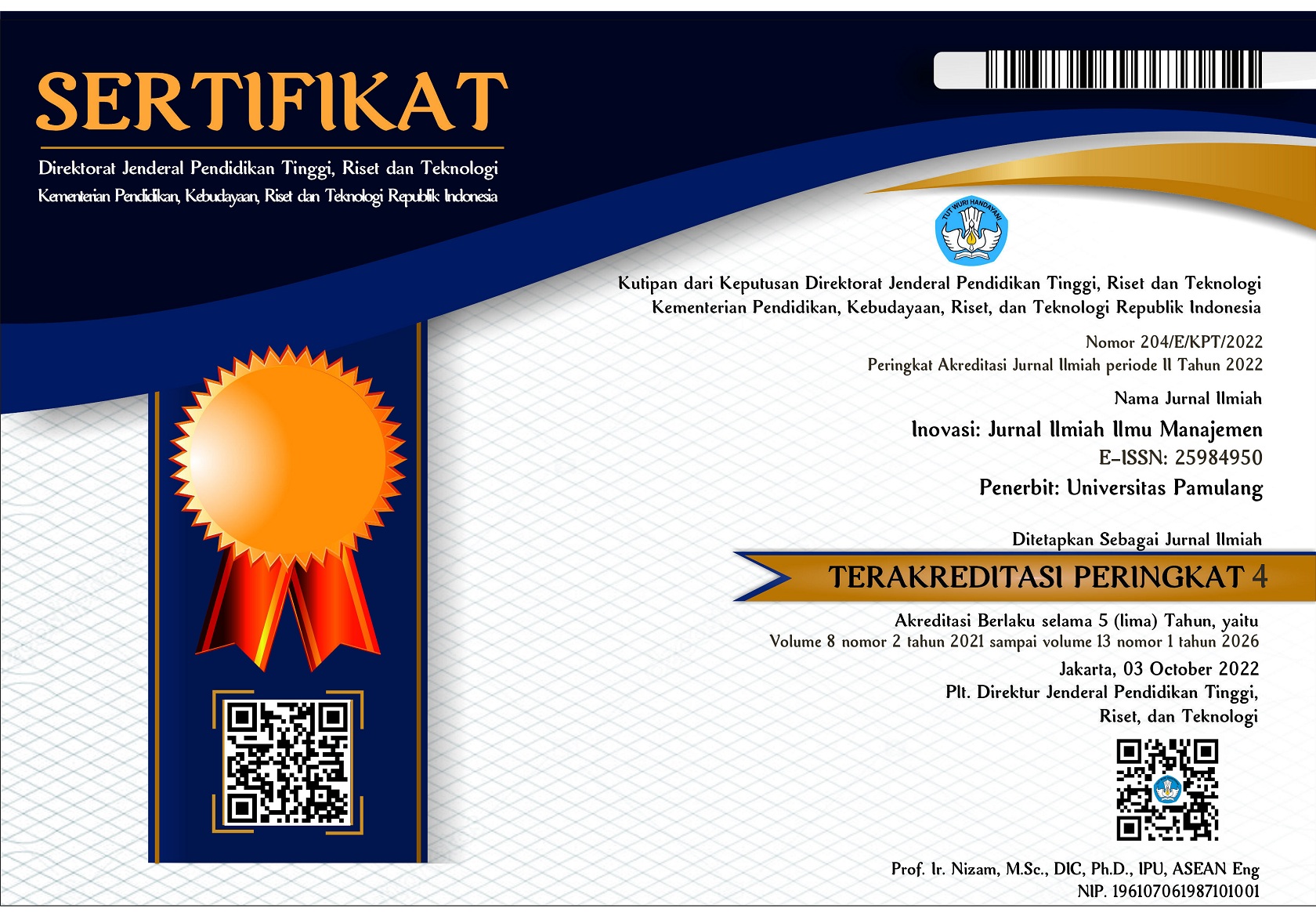Analisisi Efisiensi Penggunaan Data Berbasis Digitalisasi Dan Keamanan Arsip pada PT Angkasa Pura II Jakarta Periode 2019 – 2020 (24 Bulan) (Studi Kasus Dimasa Pandemi Covid-19)
DOI:
https://doi.org/10.32493/Inovasi.v8i2.p95-101.17458Abstract
Technological advances in the 4.0 era have made digitalization technology develop more rapidly where information can be obtained more quickly and this of course has an impact on the efficiency of data use in the company. This study aims to analyze the efficiency of data use based on data digitization and archive security at PT Angkasa Pura II, during the Covid-19 pandemic. The method used in this study is causal associative with multiple linear regression analysis, classical assumption test and hypothesis testing. The sample in this study uses digitized data, data security and frequency of data usage. The results of this study are data digitization (X1) shows a significant effect on the efficiency of data use (Y). Archive security (X2) shows a significant effect on the efficiency of data use (Y). Furthermore, data digitization and archive security simultaneously have a significant effect on the efficiency of data use. Statistically, the coefficient of determination with an R-square value of 0.489 indicates that the contribution of data digitization and archive security to the efficiency of data use is 48.9% and the remaining 51.1% can be explained from other variables. It can be concluded that with the development of digitalization technology, it is easier for people to use data. The development of digitalization technology, both directly and indirectly, has affected the company's performance which is becoming more efficient in the use of its data so that it has an impact on faster information obtained that can support the decision-making process in a company.
Keywords: Digitization, Archive Security, Data Use Efficiency
References
Atmoko, Pitoyo Widhi (2015). Digitalisasi dan Alih Media. Malang: Univerisats Bramelati.
Sugiharto, Agus dan Teguh Wahyono. (2015). Manajemen Kearsipan Modern. Jogja. Gava Media
Junie, D. (2017). Pengaruh Sistem Digital Dan Keamanan Arsip Terhadap Efisiensi, Waktu Kerja Pada Dinas Penanaman Modal Dan Pelayanan Terpadu Satu Pintu Kota Denpasar. Public Inspiration, Jurnal Administrasi Publik, Vol. 2 No. 2 (2017). ISSN 2581-2378. Universitas Warmadewa, Denpasar.
Raharjo, M. R., Ridho, I. (2019). Sistem Informasi Digitalisasi Dokumen Berbasis Multi User Studi Kasus Ditankanhut Banjarbaru. JITEKH, Vol 7, No 1, Tahun 2019, 50-54 ISSN 2338-5677 Cetak ISSN 2549-6646 Online. Universitas Harapan Medan.
Sirait, E.R.E. (2016). Implementasi Teknologi Big Data di Lembaga Pemerintahan Indonesia. Puslitbang APTIKA dan IKP, Kementerian Komunikasi dan Informatika, Jurnal Penelitian Pos dan Informatika. Vol 6 No 2 (2016) 113 – 136, e-ISSN 2476-9266. Jakarta.
Siregar, Y.B. (2019). Digitalisasi Arsip Untuk Efisiensi Penyimpanan Dan Aksesibilitas. Jurnal Administrasi dan Kesekretarisan Volume 4 – Nomor 1 - Maret 2019, ISSN 2598-2451. Sekolah Tinggi Ilmu Komunikasi dan Sekretari Tarakanita Jakarta.
Situmorang, S., Suryadinata, A. Maulana, P. (2011). Pengamanan Arsip Elektronik Menggunakan Public Key Infrastructure. Seminar Nasional Teknologi Informasi & Komunikasi Terapan 2011 (Semantik 2011) ISBN 979-26-0255-0. Universitas Dian Nuswantoro Semarang.
Undang-Undang No 7 tahun 1971. Tentang Ketentuan-Ketentuan Pokok Kearsipan perlu disesuaikan dengan perkembangan dan kebutuhan kehidupan bermasyarakat, berbangsa, dan bernegara.
Undang-Undang No 8 tahun 1997. Dokumen perusahaan.
Undang-Undang Nomor 06 tahun 2005. Kepala Arsip Nasional Republik Indonesia. Tentang Pedoman Perlindungan, Pengamanan, dan Penyelamatan Arsip Vital Dokumen/Arsip Vital Negara.
Veraniansyah, R.D.P. & Sukma, E.A. (2019). Prosedur Pengelolaan Arsip Untuk Keamanan Dokumen Di Rsia Puri Bunda Malang. Jurnal Administrasi dan Bisnis Volume : 13, Nomor : 1, Juni 2019. ISSN 1978-726X. Politeknik Negeri Malang
Wellie A. (2020). Peran Pelatihan Dalam Meningkatkan Kinerja Sumber Daya Manusia Di Masa Covid-19. Jurnal Pendidikan Akuntansi e-ISSN 2620-5866 (Online), Vol. 3 No. 3 Desember 2020 Halaman 186-194. Universitas Muhammadiyah Surabaya
Widiatmoko A.P. (2017). Pengelolaan Arsip Di Era Digital: Mempertimbangkan Kembali Sudut Pandang Pengguna. Jurnal Diplomatika Volume 1 No. 1 September 2017 Hal 1– 11. Universitas Gajah Mada Jogyarta
Zulfa, L.L, & Mujibah, E.M., & Rajaguguk, F. (2020). Pelatihan Penggunaan Perangkat Berbasis Internet dalam Pengumpulan Data Penelitian Masa Pandemi COVID-19. Jurnal Pengabdian Kepada Masyarakat. p-ISSN 2721-1541 | e-ISSN 2721-5113. Universitas Djuanda Ciawi.
Downloads
Published
How to Cite
Issue
Section
License
Authors who publish with this journal agree to the following terms:
- Authors retain copyright and grant the journal right of first publication with the work simultaneously licensed under a Creative Commons Attribution License that allows others to share the work with an acknowledgement of the work's authorship and initial publication in this journal.
- Authors are able to enter into separate, additional contractual arrangements for the non-exclusive distribution of the journal's published version of the work (e.g., post it to an institutional repository or publish it in a book), with an acknowledgement of its initial publication in this journal.
- Authors are permitted and encouraged to post their work online (e.g., in institutional repositories or on their website) prior to and during the submission process, as it can lead to productive exchanges, as well as earlier and greater citation of published work (See The Effect of Open Access).
INOVASI: journal of managenet have CC-BY-SA or an equivalent license as the optimal license for the publication, distribution, use, and reuse of scholarly work.
In developing strategy and setting priorities, INOVASI: JOURNAL OF MANAGEMENT recognize that free access is better than priced access, libre access is better than free access, and libre under CC-BY-SA or the equivalent is better than libre under more restrictive open licenses. We should achieve what we can when we can. We should not delay achieving free in order to achieve libre, and we should not stop with free when we can achieve libre.









